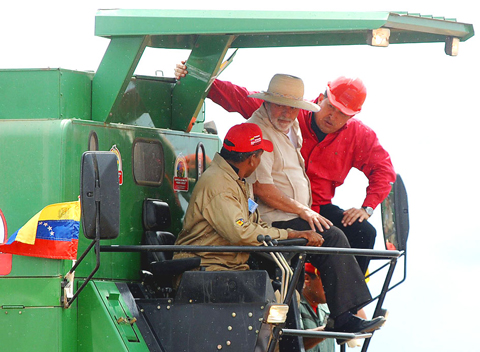Brazil and Venezuela finalized a deal to jointly build and operate an oil refinery in Brazil on Friday as the nations’ leaders signed 15 agreements pledging cooperation in agriculture, energy and technology.
Petroleo Brasileiro SA will hold a 60 percent stake in the new refinery company, and Petroleos de Venezuela SA (PDVSA) will control the rest, according to a statement from Petrobras, as the Brazilian state-run company is known.
The agreements were signed after Venezuelan President Hugo Chavez and Brazilian President Luiz Inacio Lula da Silva rode a tractor together at a soybean farm, pledging to boost trade, which totaled US$5.7 billion last year.

PHOTO: AFP
Silva called the agreements a powerful example of South American integration.
He said the two countries and South America as a whole are becoming liberated “from our own blindness; We’ve spent a lot of time without seeing each other, without discovering our potential in politics, culture and trade.”
The two nations have been working since 2005 to finalize the deal; one stumbling block had been a disagreement over the price of Venezuelan oil to supply the refinery. Last year, Petrobras began building the refinery without Venezuela’s help.
The refinery will be capable of processing 230,000 barrels of heavy crude per day and will mainly produce diesel. Petrobras says each company is to supply equal amounts of crude to the refinery, which is projected to cost US$12 billion, up from an initial estimate of US$4 billion.
Meanwhile, PDVSA has agreed to buy nearly half of the government-owned Dominican Oil Refinery (REFIDOMSA) for US$131.5 million, the Dominican Republic’s finance minister said.
Talks to sell 49 percent of the refinery shares concluded late on Thursday after negotiations with a senior Petroleos de Venezuela official, Dominican Republic Finance Secretary Vicente Bengoa said.
“With a partner ... like Venezuela, the refinery over the next years will considerably increase its production and sales,” Bengoa said.
PDVSA official Amilcar Mata said both sides were still working out the final details of the plan, which will be finalized at a ceremony in early this month.

RUN IT BACK: A succesful first project working with hyperscalers to design chips encouraged MediaTek to start a second project, aiming to hit stride in 2028 MediaTek Inc (聯發科), the world’s biggest smartphone chip supplier, yesterday said it is engaging a second hyperscaler to help design artificial intelligence (AI) accelerators used in data centers following a similar project expected to generate revenue streams soon. The first AI accelerator project is to bring in US$1 billion revenue next year and several billion US dollars more in 2027, MediaTek chief executive officer Rick Tsai (蔡力行) told a virtual investor conference yesterday. The second AI accelerator project is expected to contribute to revenue beginning in 2028, Tsai said. MediaTek yesterday raised its revenue forecast for the global AI accelerator used

Taiwan Semiconductor Manufacturing Co (TSMC, 台積電) has secured three construction permits for its plan to build a state-of-the-art A14 wafer fab in Taichung, and is likely to start construction soon, the Central Taiwan Science Park Bureau said yesterday. Speaking with CNA, Wang Chun-chieh (王俊傑), deputy director general of the science park bureau, said the world’s largest contract chipmaker has received three construction permits — one to build a fab to roll out sophisticated chips, another to build a central utility plant to provide water and electricity for the facility and the other to build three office buildings. With the three permits, TSMC

TEMPORARY TRUCE: China has made concessions to ease rare earth trade controls, among others, while Washington holds fire on a 100% tariff on all Chinese goods China is effectively suspending implementation of additional export controls on rare earth metals and terminating investigations targeting US companies in the semiconductor supply chain, the White House announced. The White House on Saturday issued a fact sheet outlining some details of the trade pact agreed to earlier in the week by US President Donald Trump and Chinese President Xi Jinping (習近平) that aimed to ease tensions between the world’s two largest economies. Under the deal, China is to issue general licenses valid for exports of rare earths, gallium, germanium, antimony and graphite “for the benefit of US end users and their suppliers

Dutch chipmaker Nexperia BV’s China unit yesterday said that it had established sufficient inventories of finished goods and works-in-progress, and that its supply chain remained secure and stable after its parent halted wafer supplies. The Dutch company suspended supplies of wafers to its Chinese assembly plant a week ago, calling it “a direct consequence of the local management’s recent failure to comply with the agreed contractual payment terms,” Reuters reported on Friday last week. Its China unit called Nexperia’s suspension “unilateral” and “extremely irresponsible,” adding that the Dutch parent’s claim about contractual payment was “misleading and highly deceptive,” according to a statement